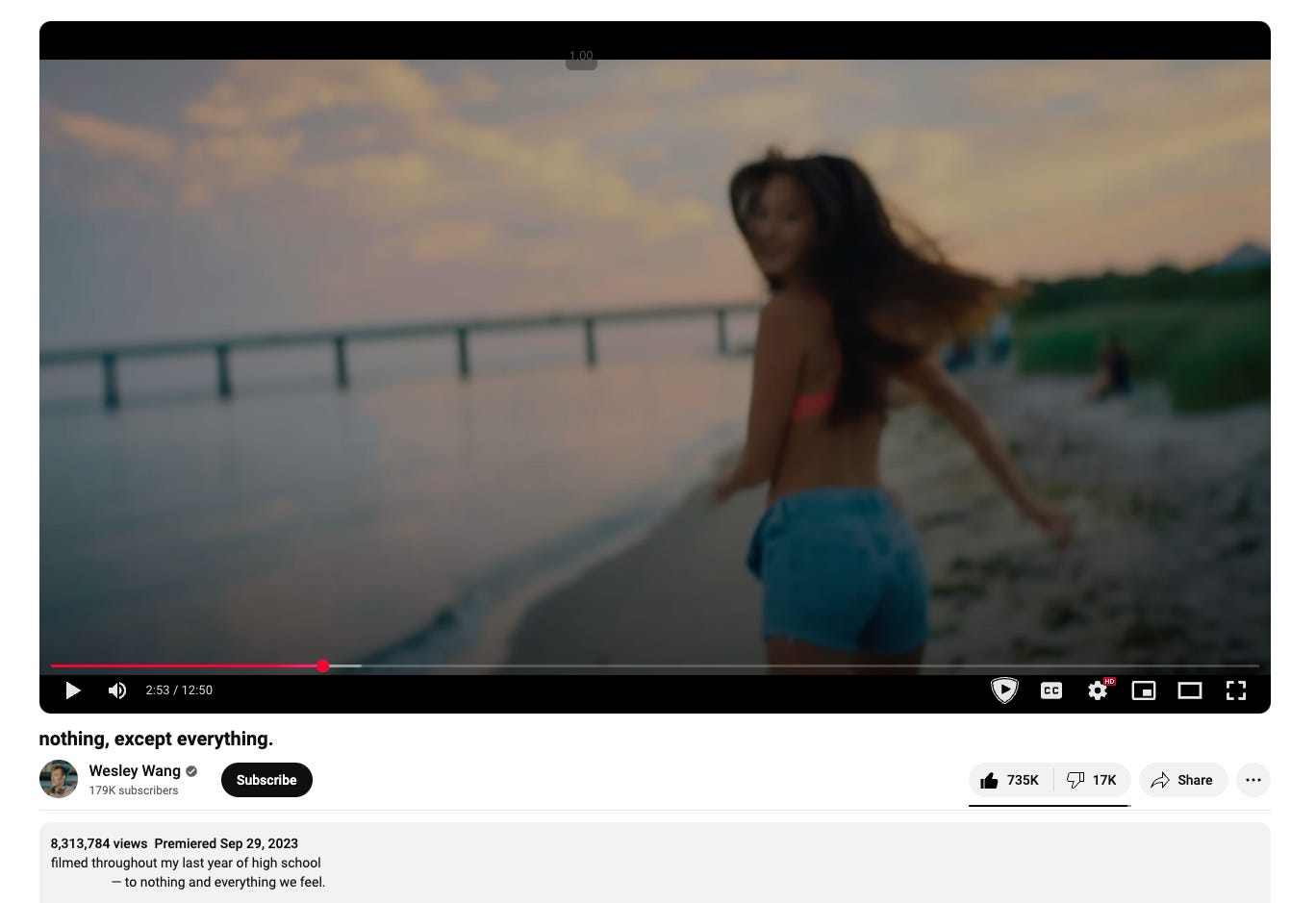I really enjoy rating things. I know it's silly, but there really is a clarifying power behind putting my opinions into words. (You don't have to agree with them, and I won't tell you about any of them unless prompted. But they're out there!)
I finally made a letterboxd account today, so you can now make fun of my mediocre taste in film! I also lurk similar forums like Rate Your Music and Goodreads.
Generally speaking, social rating platforms like Letterboxd/Goodreads/Rate Your Music tend to attract the thoughts of serious connoisseurs, critics, and the general type of person who has strong opinions on everything. I've noticed that rating scales skew far lower than one might expect from, say, a typical Google restaurant review (i.e., anything getting more than 4 stars is probably a timeless masterpiece!).
Rating deflation can be off-putting to newcomers, but once I acclimated to the "two stars=good, three stars=great, four stars=incredible" scale, I found that reviewers out there are mostly fair and respectful of both the art and the artists they're rating.
On occasion, though, I stumble across a work of art that is so thoroughly lambasted to the point where it becomes morbidly fascinating. Tonight was one such occasion.
nothing, except everything

On the surface, nothing, except everything is the knockout success story of our filmmaking generation. Wesley Wang's 8-million-view viral creation made its rounds on YouTube and TikTok and won a dazzling array of awards at multiple film festivals. At the age of 20, Wesley is now working with a major Hollywood studio to produce a feature-length version of the film.
Wesley is an incredibly inspiring person. In addition to filmmaking he's also a chess prodigy; he's been honing his craft for years to create the perfect overnight-success-ten-years-in-the-making; he kept going even after being told "no" by producers and actors hundreds of times during the early stages of this film.
Clearly, a lot of people and festival judges loved it (and I, admittedly, enjoyed it on first watch!)— which is why I was so surprised to see that nothing, except everything is one of the most universally despised short films according to Letterboxd reviewers.

After combing through one-star review after one-star review, it's not hard to understand where this hatred is coming from. Critics are fast to point out its ridiculous pretentiousness (the first thing you see is a quote from Karl Marx!), lack of substance, and blatant re-adaptation of themes from Everything Everywhere All At Once and The Perks of Being a Wallflower. It claims to be a student film, and yet has a 30-person production team, famous actors, and a budget in the tens of thousands.
People are livid, angry, and disgusted by this film. Some felt so strongly as to write paragraphs upon paragraphs on why this was the worst thing they've ever seen. Much of it is crude jealousy over Wesley's privileged upbringing and the relatedly overblown budget (which I don't think is deserved or should have been said!). But just as much of the discourse is genuine, useful criticism that I'd like to focus on for a second.
One of the most insightful takes I've found is from fellow filmmaker Sam Morgan, who made a 35-minute video response to the film. One compelling point he makes is that nothing, except everything feels so safe and sanitized to the point where it becomes meaningless. It feels inauthentic for the sake of checking all the boxes needed to win festivals, get recognition, and go viral on social media— almost as an insult to the filmmakers who stayed true to their visions at the expense of marketability.
Wesley Wang is a chess player who applies the same mindset to art. It's strategic; it's whatever's most likely to get what he wants.
What stuck out to me the most, though, is that Sam is afraid of this film and the implications of its success.
Whether he (and we) like it or not, Wesley Wang now faces the daunting task of representing an entire generation of young filmmakers on the Hollywood stage. Sam, alongside many of his peers, are now asking themselves: do we really trust Wesley to show the world what we, as Gen Z filmmakers, are truly capable of?
who's afraid of modern art?
Jacob Geller opens this video essay with the story of Barnett Newman's contemporary art series "Who's Afraid of Red, Yellow, and Blue", a set of nondescript canvases with the three colors it promises and no more.
"Who's Afraid of Yellow and Blue" is undeniably striking. For many viewers, it slapped them in the face and sent them reeling in disgust. The museum it was housed in received a bunch of angry letters about it.
One day, someone walked in with a box cutter and destroyed it. He was lauded a hero by art critics too timid to do anything about it themselves.
It's not hard to see why someone might dislike this painting (and much of contemporary art, for that matter). "It's just solid red paint, I could have done that too!" they cry.
"It's an insult to real art!"
The true reason people dislike modern art, Jacob argues, is not that it's easy to create. (Even the simplest paintings and sculptures often reflect decades of unreproducible technique and experience!). Rather, the purpose of these provocative creations is to be subversive; to challenge the default cultural narrative set by tradition. "Above all else, they're not talking about art," he concludes about the people who are the most afraid of it.
"Who's Afraid of Red, Yellow, and Blue" and nothing, except everything represent two sides on the spectrum of creative extremity: on one side, people are scared of art that's overtly radical and unorthodox; on the other, people are scared of art that's generic and inauthentic.
But if the whole point of art is to evoke emotion and spark discussion, haven't they achieved their purpose?
how much is too much?
I'm tempted to subscribe to the naïve ideal that all artists are entitled to create, and everyone else is entitled to their opinion about it. But as nice of an ideal as it may be, I don't think it's true.
As someone who publishes content online, I often grapple with the validity of the things I post. While writing this piece I thought to myself numerous times, "should I really be sharing this, or is it a thought I should just keep to myself?". I'm not a film or art critic by trade; I have no real qualifications to write today's post other than "I care a lot about this topic". There's the potential of real harm if I misrepresent something or express my ideas in ways that aren't truly authentic.
My coping mechanism for all of this is just to not take myself too seriously. It'd be a wild stretch to call what I'm making "art", after all— I'm just some random guy typing out his thoughts at 4am on a Wednesday! If anything I ever publish is problematic, you're an email away (and I'm an edit button away) from getting it removed. This is one of the risks of publishing incomplete thoughts like I do, but I think it's worth it :)
I don't believe I'm entitled to create anything. Rather, I have to earn the right to do so by showing up as my genuine self, believing in what I make, and responding to feedback that can help make it even better.
how to like everything more
There's a lot to like about the internet, but its rampant negativity is not one of them. This is a bit of a dilemma when accounting for the constructive side of criticism (which I've hopefully painted as a vitally important tool for discussion in the rest of this post!).
Perhaps the root of the problem lies somewhere in the process of unraveling nuance. For example, "I hate nothing, except everything" is a completely useless opinion in itself, but when you ask "but why?" the real, constructive thought lies closely beneath: "I think nothing, except everything sets a dangerous precedent by misrepresenting Gen Z filmmaking as shallow and meaningless".
I really like this recent post by Sasha Chapin about enjoyment as a skill that anyone can improve at:
Life is so dull if it’s just “like” or “dislike.” Maybe the movie is riveting but you still hate it. Can you find “begrudging enjoyment?” You simply do not understand the outfit of that kid on the subway. Can you locate “would be compelling to someone who is not me”? How do you feel about the song that represents you so well it’s almost personally violating? Can you be grateful for the person who reminds you of all the annoying tendencies you try to repress in yourself? These are all genuine forms of enjoyment to be cultivated and savored alongside the cleaner kinds.
I'd like to think of myself as someone who can find a sense of appreciation in any form of art, regardless of how much I don't understand about its existence. I still struggle with this sometimes; it's refreshing to view it as something that I can consciously get better at with a little practice!
And with that, I'll leave you my final review of nothing, except everything:
On first watch, I really wasn't thinking too hard about it. The cinematography is great, it's well-produced, the pacing is riveting! I let myself play into the emotions the film so clearly conveys: of nostalgia, coming-of-age, and the desire for meaning-making in a world full of nihilism.
There's a lot to like on first glance, but when you try to take it apart and really ask, 'what is this film trying to convey?' the answer is... nothing? As in, it reminds me of a typical Instagram feed, sparkly and engaging but devoid of any narrative.
Maybe that's what Wesley was trying to get at here— to express himself in a way that is only really decipherable by the kids like us who grew up with chronic internet access, scrolling endlessly for dopamine, trying to find the bottom of a feed that gives us nothing in return.
I give nothing, except everything 3 stars.








"I give nothing, except everything 3 stars."
"Wait... so he loved it? Sic 'em Nut Cruncher".
I'll always love a Jacob Geller Reference.
Nothing, Except Everything briefly came up on my feed at one point, I didn't sit through it. It wasn't indifference, it was an active dislike of the film. Didn't realize that people were slamming it on Letterboxd though. Of course: in it's own roundabout way having a film that so many people engage with is an achievement to be proud of (even if there's a lot of haters).
I like your final point. I think life in general is better the more things you like and the more you like them. Unfortunately, that's not how we reward media. The main driver of media value is engagement. And so that's what we reinforce: media that we engage with.
I don't think that's strictly a bad thing, but it's just not aligned with any particular moral compass. A piece of media can be very sad, scary, or absurd and that brings us to engage with it. And I like that. I like feeling things. Although some emotions I'm fine with feeling less of.
Drama Youtube channels are a good example of a very successful format that I just plain old "don't like". For the most part these Youtube channels tend to be very venomous in tone, with an unsympathetic + holier-than-though attitude towards their subjects. These channels don't even make the viewer feel better about themselves, and my guess is they actively make these people unhappier (by filling them with anger).